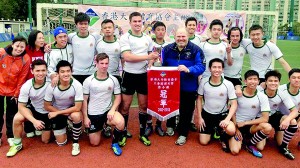Following in Hong Kong’s footsteps is not a bad idea
View(s):450,000 to become a fulltime sevens professional? The answer is obvious and will be in the affirmative.
This is the maximum amount their Hong Kong counterparts will get now that rugby sevens has been included as an elite sport at the Hong Kong Sports Institute.

Ambitious Hong Kong want to become the first Asian team to become a core team on the IRB Sevens World Series, and they have made the initiatives by targetting the youngsters.
First let’s explain what this Institute is. It is an elite training academy where 15 sports currently reside – 16 with rugby sevens inclusion from April 1 – and enjoy state-of-the-art facilities with an eye on winning medals primarily at the Asian Games with the Olympics also being targeted ambitiously.
Every sport from athletics to badminton and table tennis are funded by the Hong Kong government with those with the highest potential for medals receiving as much as 100 million rupees a month, the majority of this being spent on athletes.
In addition to paying monthly training grants, inclusion in the Sports Institute guarantees among other things world-class high-performance coaching, with athletes having access to onsite accommodation, the use of high-end sports science and medicine, educational support funding, as well as funding for training and competition overseas.
As expected, there is a huge demand to get into the Sports Institute which is based in Shatin, more famous for its horserace track. But it is not easy to qualify to become an elite sport. There is a stringent qualification process with sports having to attain nine points split between its senior and junior teams at Asian or Olympic level.
Rugby sevens got the nine marks thanks to its men’s squad winning a silver medal at the 2010 Guangzhou Asian Games – Sri Lanka came close to upsetting Hong Kong in the quarterfinals losing 19-14 – while the junior team also gained valuable points by finishing runners-up to Japan in the U-20 Asian Sevens Championship last year.
Together, those results have allowed rugby sevens to become the only team sport at the Hong Kong Sports Institute, and the future is secure for the next four years, until 2017.
In this period, if Hong Kong rugby again win a medal at the Asian Games – next year in Incheon, South Korea – or if it qualifies for the Olympics (2016 Rio de Janeiro when the abbreviated version of the sport makes its much-awaited debut) then another four-year cycle is guaranteed.
By giving support over a four-year period, the intent is clear. Sports can work out their long-term programmes and target success at the Asian Games and Olympics.
Rugby sevens inclusion was greeted with much euphoria by the Hong Kong Rugby Football Union whose last visionary five-year strategic plan included entry into the Sports Institute.
 The HKRFU is not poor. In fact, at last count, it had around HK$240 million in the bank (around 3.6 billion rupees) money mainly acquired from the hugely successful Hong Kong Sevens. Yet, the governing body is over the moon that it can now tap into additional funding from the government for its ambitious sevens programme.
The HKRFU is not poor. In fact, at last count, it had around HK$240 million in the bank (around 3.6 billion rupees) money mainly acquired from the hugely successful Hong Kong Sevens. Yet, the governing body is over the moon that it can now tap into additional funding from the government for its ambitious sevens programme.
What inclusion into the Sports Institute (SI) will do is be a catalyst to make rugby sevens in Hong Kong a fulltime endeavour. At present rugby, both sevens and 15s, is mainly an amateur pursuit. The players’ main focus is on work and rugby is secondary.
All this will change now that the Sports Institute offers opportunities for a player to go fulltime. In fact the SI wants fulltime athletes. This will mean the HKRFU can put in place a programme to cater for fulltime sevens players, not having to worry about having to pay for those expenses which will now be taken care of by the government through the SI.
As it is, the Hong Kong sevens team is one of the best in Asia. Indeed, last year, they were crowned Asian champions for the first time by winning the Asian Sevens Series, overthrowing Japan in the process.
With the backing of the SI, the momentum will increase. Hong Kong has huge ambitions. They want to become the first Asian team to become a core team on the IRB Sevens World Series and next week their fate will be decided when they take part in the qualifying competition at the London Sevens.
Hong Kong is the only team from Asia in this eight-team competition with three core team spots available. They have gone one better than Japan who failed to make it to these qualifiers. Eddie Jones, Japan’s 15s head coach, admitted that in sevens, Hong Kong was better than Japan.
With the help of the SI, things can only get better for sevens in Hong Kong. Long-term planning has played a huge part in this enviable position Hong Kong is in. Despite having a small base of players, this former British Colony punches above its weight class.
Just imagine what Sri Lanka, with its larger player-base, can achieve if its administrators and clubs all pull together – something worth seriously pondering over your arrack.
Follow @timesonlinelk
comments powered by Disqus





















